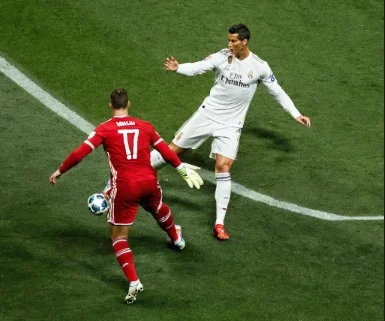Bayern
Munich vs Real Madrid has been the most frequent duel in the Champions League
semifinals, but their clash is not always exciting.
Bayern
Munich and Real Madrid are set to meet again at the Champions League semifinals
this week. It will be their eighth encounter in the tournament’s semifinal
history, way ahead of the other fierce duels such as El Classico, Liverpool vs.
Chelsea, or the most recent one, Real Madrid vs. Manchester City. Each clash
only occurs three times.
Interestingly,
the matches between Die Roten and Los Merengues in the last four have given
equal results. Each side has clinched six wins and shared spoils twice. Their
first encounters took place in 1976, when Franz Beckenbauer and Co. snatched a
3-1 victory on aggregate to get them through the final and eventually lift
their third trophy in a row. Meanwhile, the last duel was six years ago, when
Cristiano Ronaldo and Co saw off the Bavarians with a 3-2 win on aggregate,
which also led to Los Blancos’s consecutive triumph in the final.
In
between those two encounters, they squared off in 1987, 2000, 2001, 2012, and
2014. Bayern won the clashes in 1987, 2001, and 2012 to reach the summit,
whereas Real Madrid eliminated them in 2000 and 2014. Among those duels, most
were tight. Yet there were times when the duel became one-sided. Here are two
contrastive ones from their meetings. Surprisingly, both were only staged in
the last decade.
The
Dullest Duel
Their
duel in the 2013–14 continental campaign was probably the dullest one compared
to the others. It was Bayern and Real Madrid’s first season under new bosses,
Pep Guardiola and Carlo Ancelotti, respectively.
The
first leg in Bernabeu was still quite even. Both sides had a number of shots on
target. The home side hit the target more than the visitors. Yet, Bastian Schweinsteiger
and Co. struck a lot more in total. Both shot stoppers, Casillas and Neuer,
made equal saves. Yet, it was Madrid who scored the only goal of the game from
Karim Benzema, who took advantage of Fabio Contreao’s pass from the left flank.
The former French international, who was already at the mouth of the goal,
slotted home at his mercy.
On
the contrary, the second leg was disappointing for the German side. They were
hapless and slumped to a heavy 4-0 defeat on their home turf. Despite having
more shots in total, Guardiola’s men were unable to find the back of the net. They had already conceded three goals before the interval from Sergio Ramos’s brace andCristiano Ronaldo in less than 30 minutes. The Portuguese superstar finally
sealed their berth in the final as he added his tally from a free kick. It was
a 5-0 win on aggregate for Los Blancos, which eventually lifted their 10th
trophy.
Match statistics:
|
|
Madrid vs Bayern 1-0 (1st leg) |
Bayern vs Madrid 0-4 (2nd leg) |
||
|
Shots on goal |
5 |
4 |
4 |
5 |
|
Shots off target |
3 |
5 |
7 |
6 |
|
Saves |
4 |
4 |
1 |
4 |
|
Blocks |
1 |
9 |
8 |
2 |
The Most Thrilling Duel
In contrast to the 2014 duel, the
2012 one was the most thrilling one. It was the only clash which had to be
determined on penalties. At that time, Los Blancos was led by Jose Mourinho
whereas Die Roten had Jupp Heynckes in the dugout.
In the first leg, Bayern played
host first and they managed to optimize the home advantage. It was a tight
affair as expected and both sides traded attacks and attempts before Franck
Ribery opened the scoring in the 17th minute. The former Werder Bremen
man, Mesut Ozil, bagged an equalizer at the second half. When the game was
about to end in a tie, Mario Gomez finally put in his on the score sheet a few
minutes before the final whistle. It was a relief for the towering frontman as
he was frustrated almost throughout the game.
In the reverse fixture, Real
Madrid responded well by securing a narrow win with the same exact score 2-1.
They did not waste their time to score. CR7 netted a brace in less than ten minutes. First, he did it from the penalty spot before he doubled his tally
from a close range after receiving a through ball from Mesut Ozil. Bayern Munich soon replied in the 27th minute from the penalty too. Arjen Robben took
it well to level the aggregate. Both teams continued creating chances but the
score remained the same, which led to the shootout.
Bayern started off well with
David Alaba and Mario Gomez successfully found the back of the net. On the
contrary, the home side failed in their first two shots as their two most
expensive signings, Cristiano Ronaldo and Kaka, had their penalty saved by
Manuel Neuer. Madrid suddenly had a hope to turn it around as Casillas denied
Toni Kroos’ and Phillip Lahm’s whereas Xabi Alonso scored. Unfortunately,
Sergio Ramos blew it as his kick went off the crossbar. Bastian Schweinsteiger
finally slotted it home and send them through the final.
Match statistics:
|
|
Bayern vs Madrid 2-1 (1st leg) |
Madrid vs Bayern 2-1 (1-3) pen (2nd leg) |
||
|
Shots on goal |
4 |
6 |
6 |
6 |
|
Shots off target |
6 |
3 |
7 |
9 |
|
Saves |
5 |
2 |
5 |
4 |
|
Blocks |
5 |
6 |
2 |
5 |



Comments
Post a Comment